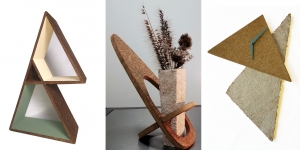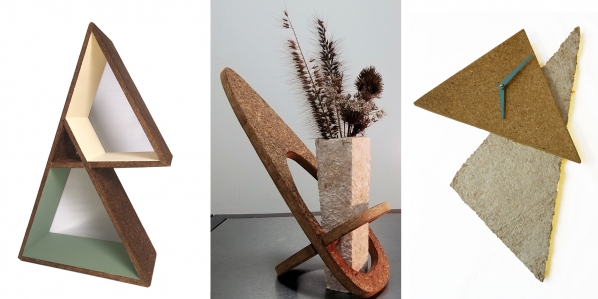Furniture designer Alyssa Coletti is determined to expand student exposure to and experience with sustainable design. An adjunct in Appalachian State University’s Department of Applied Design in the College of Fine and Applied Arts, she teaches just one or two courses per semester with the goal of providing a unique and hands-on experience for her students.
During fall 2016, her Preliminary Design Studio partnered with Ecovative Design, a New York-based biomaterials company that uses mycelium, or mushroom roots, and agricultural waste, including hemp and cornstalks, to create non-toxic materials that are used in the packaging and furniture industries. The company developed and patented the process of using mycelium of a mushroom as ‘nature’s glue’ to bind agriculture salvage together, making it possible to biofabricate an array of sustainable products.
Coletti’s students were tasked with developing sustainable home and office accessories by using Ecovative’s GIY (Grow-it-Yourself) Mushroom® materials to literally grow their product, or by working with Ecovative’s already-grown MycoBoardTM. The GIY has a Styrofoam-like texture while the MycoBoard is similar in structure to a dense particle board.
“The Ecovative products differ from materials such as wood, metal and plastic in that they have different structural properties, and they are less costly for tooling and fabrication. They can also be molded into forms that would be difficult or impossible to achieve with other materials,” mentioned Coletti. “I knew the students would be challenged figure out how to design products that highlight the materials’ strengths, but given their limited knowledge of fabricating techniques as sophomores, it was a good point to introduce them to these materials.”
The class was structured to familiarize the students with these unique materials early in their college career, before they developed extensive knowledge of other materials. According to Coletti, it’s imperative that students get comfortable using more environmentally sound products in their designs early on in their education.
“Sometimes environmentally safe products can be more expensive, but there’s often a business and sustainability case for doing so, including LEED certification,” she said. “Consumers are now looking specifically for these types of products.”
In addition to providing materials for the students, Ecovative’s design lead, Jeff Betts, was often present in class via video chat to critique designs and offer advice.
“Jeff provided the initial introduction to Ecovative and their unique materials, and spent many hours providing in-depth critiques to students,” recalled Coletti. “The students received feedback that addressed both the design and feasibility of their products using these materials.”
Industrial design major Lindsay Everhart of Lexington was one of the sophomores enrolled in the course, and she especially enjoyed the opportunity to build her “EcoMetric” shelving. She used the MycoBoard to craft triangle-shaped shelves that can be used both together or separately.
“Many design classes at Appalachian are similar to this class, yet our final models may be computer-rendered instead of physically built,” she shared. “I personally love hand-building models because of my meticulous nature and desire to physically hold the end product.”
John Lalevee, another industrial design major who took the course, was one of the few students to experiment with Ecovative’s GIY material. The GIY starts as a bag of dehydrated mushroom™ material that can be grown into a form of the designer’s choosing by adding flour and water, then baking in a mold. Lalevee, of Raleigh, designed a wall clock after realizing that the GIY was relatively fragile compared to the MycoBoard and better suited to a product that wasn’t often handled. He enjoyed the collaborative nature of the studio, and the frequent feedback.
“Studios are more like small creative communities than classes. It's a collaborative culture where concepts are supported and executed,” he said.” My peers and Professor Coletti gave me the input to make my designs more universal and functional.”
Fellow industrial design major Ryan Decker of Hendersonville also used both MycoBoard and GIY to build his “EcoVase.” His first experience in a full-scale design studio at the university, the course provided the opportunity for him to take his concept from research and sketches all the way to final models.
“I think the pairing of a sustainable material with nature is important and allows for one to bring natural elements back inside,” he said. “The vase is meant to serve as a decorative center piece, borrowing from sculpture more than product.”
Coletti hopes that the course provided students with a different perspective and exposure to a unique material while showcasing the importance of sustainability in Appalachian’s curriculum and within the design field. She’s also thrilled that student work from the class will be on display through the month of April as part of the “Activision” exhibit on campus.
“I love that the students had fun with the project,” she said. “They got great results, and maybe this experience will open doors for their career down the road.”
About the Department of Applied Design
One of seven departments housed in the College of Fine and Applied Arts, the Department Applied Design at Appalachian State University fosters excellence in design education, design research and professional placement. The department balances theoretical and pragmatic approaches while exploring an awareness of impact through design decisions on the global community. Faculty focus on a holistic approach to creative problem-solving by integrating sustainability and ethical responsibility in teaching and practice. The department offers bachelor’s degrees in apparel design and merchandising, industrial design and interior design.
About Appalachian State University
Appalachian State University, in North Carolina’s Blue Ridge Mountains, prepares students to lead purposeful lives as global citizens who understand and engage their responsibilities in creating a sustainable future for all. The transformational Appalachian experience promotes a spirit of inclusion that brings people together in inspiring ways to acquire and create knowledge, to grow holistically, to act with passion and determination, and embrace diversity and difference. As one of 17 campuses in the University of North Carolina system, Appalachian enrolls about 18,000 students, has a low student-to-faculty ratio and offers more than 150 undergraduate and graduate majors.
About Ecovative Design
Ecovative is a leading biomaterials company growing high performance, premium, award-winning products that are safe, healthy, and certified sustainable. Ecovative’s packaging, interiors products, and GIY (grow-it-yourself) Mushroom® materials enable customers—including Fortune 500 companies - to meet their design, production, and delivery needs while achieving sustainability goals. Founded in 2007, the pioneer and world leader in mycelium-based biomaterials uses biology to grow materials with exceptional properties unattainable through conventional chemistry.

